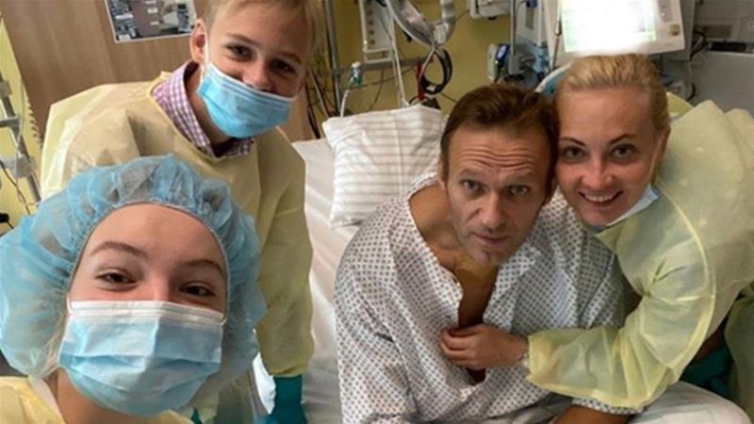The nerve agent used to poison Russian opposition leader Alexey Navalny was detected on an empty water bottle from his hotel room in the Siberian city of Tomsk, suggesting he was poisoned there and not at the airport as first thought, his team said on Thursday.
Navalny fell violently ill on a domestic flight in Russia last month and was subsequently airlifted to Berlin for treatment.
Laboratories in Germany, France and Sweden have established he was poisoned by a Novichok nerve agent, though Russia denies this and says it has seen no evidence.
A video posted on Navalny's Instagram account showed members of his team searching the room he had just left in the Xander Hotel in Tomsk on August 20, an hour after they learned he had fallen sick in suspicious circumstances.
"It was decided to gather up everything that could even hypothetically be useful and hand it to the doctors in Germany.
The fact that the case would not be investigated in Russia was quite obvious," the post said.
It showed his team bagging several empty bottles of "Holy Spring" mineral water, among other items, while wearing protective gloves.
"Two weeks later, a German laboratory found traces of Novichok precisely on the bottle of water from the Tomsk hotel room," the post said.
"And then more laboratories that took analyses from Alexei confirmed that that was what poisoned Navalny. Now we understand: it was done before he left his hotel room to go to the airport."
Vladimir Milov, a former deputy energy minister and an ally of Navalny, said his team had outplayed the FSB security police with their quick thinking: "They took the evidence from under their noses and shipped it out of the country."
Navalny is the most prominent political opponent of President Vladimir Putin, even though he has not been allowed to form his own party.
His investigations of official corruption, published on YouTube and Instagram, have reached audiences of many millions across Russia.
Germany, France, the United Kingdom and other nations have demanded explanations from Russia over the case, which has prompted calls for new sanctions against Moscow.
The global chemical weapons agency, the OPCW, said on Thursday that Germany had asked for its assistance in investigating.
Russia has carried out pre-investigation checks, but said it needs to see more medical analysis before it can open a formal criminal investigation.
Latest Stories
-
EBID wins the Africa Sustainability Award
53 minutes -
Expansion Drive: Takoradi Technical University increases faculties
5 hours -
SHS heads demand payment of outstanding funds before reopening of schools
6 hours -
We thank God for the 2024 general elections – Akufo-Addo
6 hours -
Coconut Grove Beach Resort marks 30 years of excellence with memorable 9 lessons & carols service
6 hours -
WAFU B U-17 Girls’ Cup: Black Maidens beat Nigeria on penalties to win inaugral tournament
7 hours -
Real Madrid beat Sevilla to keep pressure on leaders Atletico
8 hours -
Liverpool put six past Spurs to go four points clear
8 hours -
Manchester United lose 3-0 at home to Bournemouth yet again
8 hours -
CHAN 2024Q: ‘It’s still an open game’ – Didi on Ghana’s draw with Nigeria
8 hours -
CHAN 2024Q: Ghana’s Black Galaxies held by Nigeria in first-leg tie
9 hours -
Dr Nduom hopeful defunct GN bank will be restored under Mahama administration
10 hours -
Bridget Bonnie celebrates NDC Victory, champions hope for women and youth
10 hours -
Shamima Muslim urges youth to lead Ghana’s renewal at 18Plus4NDC anniversary
11 hours -
Akufo-Addo condemns post-election violence, blames NDC
11 hours

